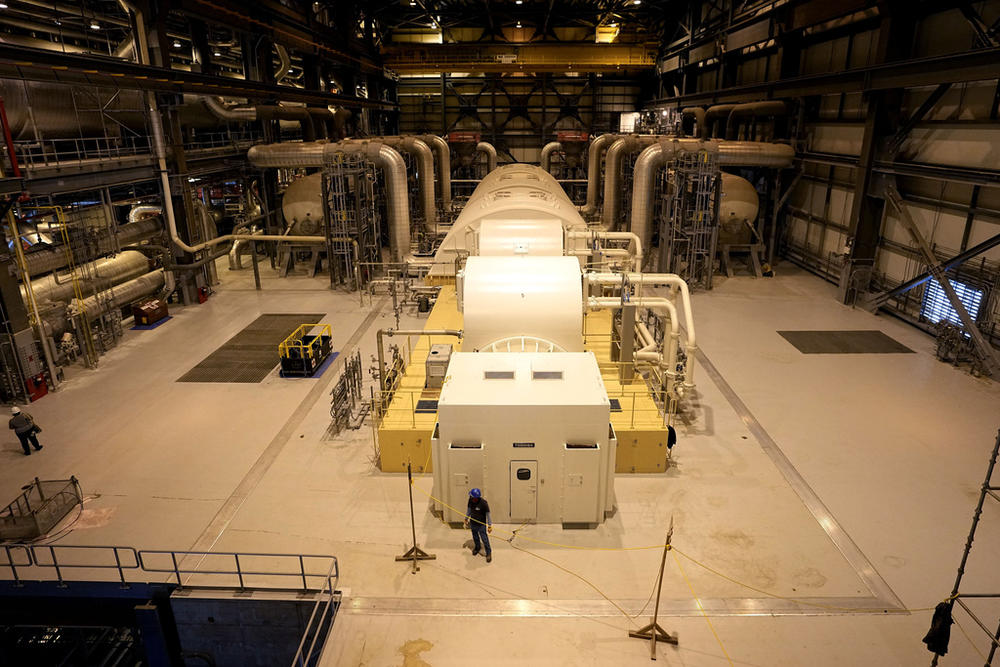
Caption
A turbine that generates electricity using steam heated by nuclear fission sits at Georgia Power Co.'s Plant Vogtle nuclear power plant Jan. 20, 2023, in Waynesboro, Ga.
Credit: AP Photo/John Bazemore, File

A turbine that generates electricity using steam heated by nuclear fission sits at Georgia Power Co.'s Plant Vogtle nuclear power plant Jan. 20, 2023, in Waynesboro, Ga.
Workers have begun loading radioactive fuel into a second new nuclear reactor in Georgia, utilities said Thursday, putting the reactor on a path to begin generating electricity in the coming months.
Georgia Power Co. says workers will transfer 157 fuel assemblies into the reactor core at Plant Vogtle, southeast of Augusta, in the next few days. There are already three reactors operating at the plant. Two reactors have been operating for decades, while the third reactor entered commercial operation on July 31, becoming the first new nuclear unit built from scratch in the United States in decades.
It's a key step toward completing the two-reactor project, which is seven years late and $17 billion over budget.
Once fuel is loaded, operators will conduct tests and begin splitting atoms, which creates the high temperatures that boil steam that drives turbines, which generates electricity. The company says unit 4 is supposed to reach commercial operation by March 2024.
The U.S. Nuclear Regulatory Commission ruled Unit 4 was ready for fuel in July.
In Georgia, almost every electric customer will pay for Vogtle. Georgia Power, the largest unit of Atlanta-based Southern Co., currently owns 45.7% of the reactors. Smaller shares are owned by Oglethorpe Power Corp., which provides electricity to member-owned cooperatives, the Municipal Electric Authority of Georgia and the city of Dalton. Some Florida and Alabama utilities have also contracted to buy Vogtle's power.
Currently, the owners are projected to pay $31 billion in capital and financing costs, Associated Press calculations show. Add in $3.7 billion that original contractor Westinghouse paid to the Vogtle owners to walk away from building the reactors, and the total nears $35 billion.
Georgia Power's 2.7 million customers are already paying part of the financing cost, as a well as a monthly rate increase of more than $4 for the third reactor, which takes effect with bills this month.
But the elected five-member Georgia Public Service Commission will decide later who pays for the remainder of the costs. Regulators have said loading fuel into the fourth reactor will be the trigger for deciding whether Georgia Power's spending decisions were prudent.
That process will determine how much the company's customers will pay for Vogtle, as opposed to whether shareholders absorb additional losses. Georgia Power CEO Kim Greene has said the company hasn't decided how much it will ask customers to pay. Southern Co. has written off $3.26 billion in Vogtle losses since 2018, suggesting it won't recoup those costs.
The high construction costs have wiped out any future benefit from low nuclear fuel costs in the future, experts have repeatedly testified.
Commissioners earlier said they would presume $5.7 billion of Georgia's Power's spending as prudent. The company is now projected to spend more than $10.5 billion on construction and $3.5 billion on financing.
At its full output of 1,100 megawatts of electricity, each of the two new units will be able to power 500,000 homes and businesses. A number of other utilities in Georgia, Florida and Alabama are also receiving the electricity.
Vogtle is important because government officials and some utilities are again looking to nuclear power to alleviate climate change by generating electricity without burning natural gas, coal and oil. But most focus in the U.S. currently is on smaller nuclear reactors, which advocates hope can be built without the cost and schedule overruns that have plagued Vogtle.